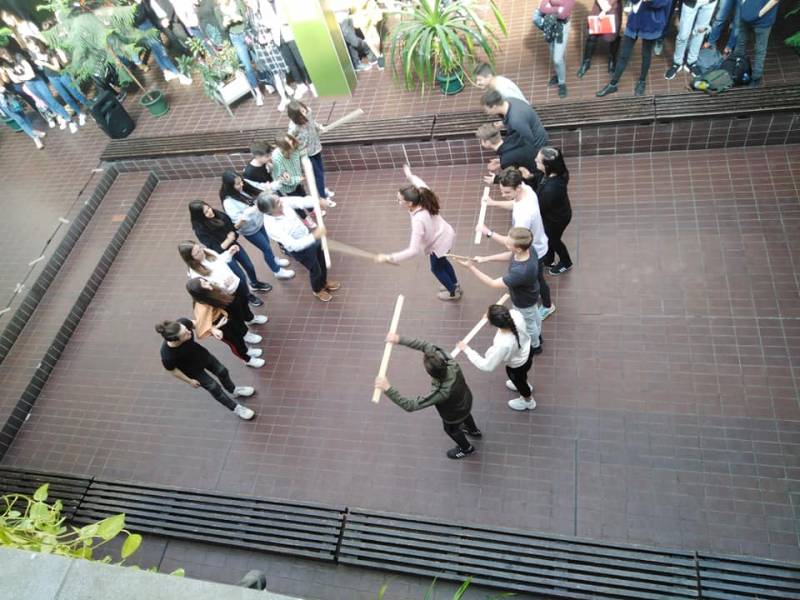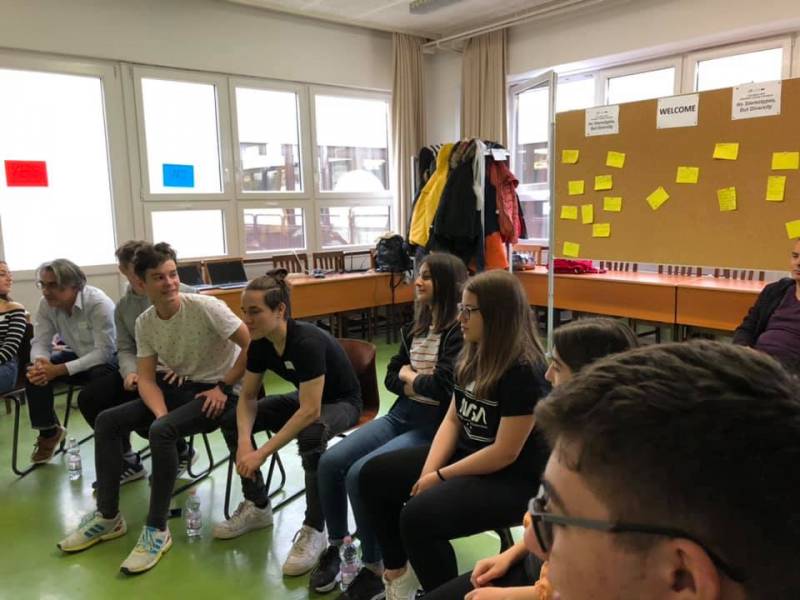
The Erasmus+ project called No Stereotypes But Diversity, implemented by Ady Endre Secondary Grammar School of Budapest, addressed the sensitive issue of prejudice and stereotypes. We talked to Project Coordinator Zoltán Sallai, teacher of ethics, moral philosophy, drama and dance. He thinks that, besides students, the schools and teachers could also benefit from such a partnership.
Be Open - Against Stereotypes - through Active Social Engagement
| Institution: Ady Endre Secondary Grammar School of Budapest, 13th District Project title: No Stereotypes But Diversity Project Coordinator: Zoltán Sallai Website: www.nostereotypesbutd.com |
What was the main goal of the project?
We focused on the struggle against prejudice and stereotypes through a variety of activities and student mobility. We searched for solutions which allow us to develop a more tolerant mentality, and through that, to build a more peaceful world, while also developing students' skills and competencies. The goals of the project sought solutions to very important and current issues: the fight against hate speech and incitement to hatred at school; increasing social awareness and tolerance regarding immigrants and refugees; eliminating stereotypes and raising awareness of the risks they caused. Four schools worked for two years to help us learn and more broadly understand these phenomena and the significance of the problems.
What activities did you implement under the project?
We laid the emphasis on active social engagement; a number of professional visits, field practices, campaigns and programmes increasing acceptance were implemented, where the participants also had a chance to meet experts and the representatives of various authorities. Learning from each other and many CSO's, and adopting best practices, our institutions developed, too. Using creative methods, such as role plays, painting the project logo on the wall of the school, making and exhibiting posters or creative poem writing, was an emphatic project element. One of the most innovative elements was the cooperation with CSO's, but the methodological collection also offered a number of new pedagogical methods and ideas, which can be a useful resource material in classes.
What were the actual topics discussed at various events?
Each partner meeting had its own focus. Stereotype thinking and discrimination at school; prejudice based on nationality; the forms of discrimination; stereotypes based on gender and race, and their effects; instances of discrimination against religions. A rather divisive topic both among the colleagues and the students was enhancing tolerance towards immigrants and refugees. Addressing this issue was a rather bold move, and we were faced with resistance a couple of times, too. Since people's views on this topic are generally controversial, we were also faced with a strong rejection from students, colleagues and parents.

Who did you cooperate with during the implementation of the project, both in and outside the country?
We worked with Spanish, Romanian and Turkish organisations; each partner organised project meetings or training programmes where we could learn about each other's best practices, as well as the CSO's operating in the area. Strengthening the relationship between them and the authorities may help the knowledge and methodological renewal to be taken into the school, of which the school by itself is less capable of. We also involved a number of external partners; during the two years, we got into contact with 34 organisations. At a local level, we also kept in touch with institutions in nearby regions implementing other Erasmus+ projects, and we organised a joint event in order to share experiences and help each other. As the outcome of the worked completed, we collected over 30 proven methods, which we also made electronically available on the TwinSpace site of our project (NO HATE in our lives - Breaking free from stereotyping and discrimination). The material is an excellent collection of interactive games, lesson plans and various other methodological resource materials in four chapters: methods of mitigating stereotypes and discrimination; methods of helping the acceptance of immigrants and refugees; opportunities of cooperation with CSO's and professionals; short films. The materials prepared can be a useful tool for teachers of any school when addressing the issue of social inclusion.
What methodological tools did you learn about during the common work?
We mainly improved in using digital applications, which facilitated cooperation and applying innovative methods, such as sharing in Google Drive, Facebook, Kahoot or TwinSpace. At the project meetings, the participants could also see how the pedagogical methods and strategies used by their partners worked in practice; they could now personally experience their usefulness and integrate them into their own educational work. Thus, at the various workshops held during the meetings, teacher training was also implemented.

How do you think the school and the participants have generally benefited from the project?
The issue of non-prejudice was addressed with more emphasis than normally at the schools during classes as well as extracurricular activities. The students involved gained a lot of new knowledge and experiences; their English and communication skills, and even their self-knowledge, self-assessment and social sensitivity improved. We also managed to involve the students, the families as well as the members of the local communities in the joint events in large numbers.
The teachers involved in the project improved in areas of professional and personal competencies which they can't practice much in their day-to-day work, but are necessary. They gained innovative methodological knowledge, which they also intend to use in the future, thus ensuring and enhancing the long-term impacts of the project.
Both the teachers and the students also benefited a lot from the involvement of external professionals and CSO's. The knowledge thus gained will be used by the teachers in their everyday work.
The project activities, as well as our colleagues' sensitivity to the topic and their professional development generated a lot of related programmes in all the partner institutions, which is a significant outcome in itself.
What advice would you give to schools considering a similar project?
Confrontation with our own colleagues is part of implementing such projects. Unfortunately, it's hard to make the methodological work clearly visible; to our colleagues, absence and travels are often much more conspicuous. That's why making our colleagues' work visible is motivating, and it also justifies our work and supports the project goals. It should be very important to everyone! The fruit of our work "smells and tastes nice", and it can be definitely inspiring, providing strength in difficulties. Flexibility, readiness to compromise and patience are indispensable. We must be able to be fascinated and surprised by and see behind differences! It may happen that we don't fully get the expected outcomes in the planned area, but we gain wonderful and very exciting experiences in some completely different respect. We should be adequately open to that.
|
PROJECT VALUES The relevance of the project is provided by its topicality and, at the same time, its universal nature. The topic is an important pillar of European educational and social policy, and the partners took the opportunity to sensitise young people in a very sensitive period, the transition from primary to secondary school. They used very varied activities and methods to help the implementation of the priorities (enhancing skills and competencies, social inclusion). Calling the attention to and fight against exclusion and discrimination based on gender, race or religion is never easy, but the choice of partners and the distribution of tasks was excellent, and the continuous self-reflection and assessment of the common work was outstanding. |
Utolsó módosítás: 2020.07.27.












